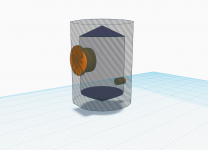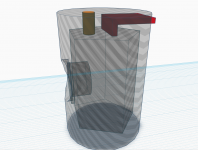laserscape,
With your proposed changes it should still be ok.
How are you planning to build the cabinet?
With your proposed changes it should still be ok.
How are you planning to build the cabinet?
Last edited:
Cabinet build
1/2" baltic birch w/ 1/4"-(1/2" veneer baffle) oak veneer, stained with a Mission finish
1/2" baltic birch w/ 1/4"-(1/2" veneer baffle) oak veneer, stained with a Mission finish
laserscape,
With your proposed changes it should still be ok.
How are you planning to build the cabinet?
Stealing some of the clever ideas from the TQWT concrete cabinet thread, the concrete will be cast in a wooden box to form the exterior with a suspended chunk of polystyrene to form the internal cavity. Bolts for driver will set in concrete rather trying to screw into concrete, the alpair bezel covers will be handy for molding the driver recess and keeping the bolts correctly aligned.
Not sure how thick the walls will be yet, kind of want them to be very thick (5cm) .
I was trying to refrain from doing something exotic for the first concrete build, just copy a simple and effective design to be able evaluate concrete's basic performance as an enclosure material (which has a lot of mixed feedback) for more exotic stuff later on.
But that is the thing with concrete, its has the unique advantage of moldability.
making a round enclosure with concrete is no more difficult than a cube, wood-based material OTOH making it round is very difficult, it doesn't make sense to compare concrete in a basic 'wooden' shape.
Concrete biggest weakness must be it's reflectiveness, think of a room with concrete walls and floors.
But it moldability can be used to counteract that with a round internal walls
Below is a rough example of a cylindrical enclosure I think I might try to build instead, I already have some plastic buckets that are the perfect size for it, making the wooden boxes to cast the original square enclosures would have been a good portion of the work.
It would maintain the same volume and port dimensions as the other enclosure
But that is the thing with concrete, its has the unique advantage of moldability.
making a round enclosure with concrete is no more difficult than a cube, wood-based material OTOH making it round is very difficult, it doesn't make sense to compare concrete in a basic 'wooden' shape.
Concrete biggest weakness must be it's reflectiveness, think of a room with concrete walls and floors.
But it moldability can be used to counteract that with a round internal walls
Below is a rough example of a cylindrical enclosure I think I might try to build instead, I already have some plastic buckets that are the perfect size for it, making the wooden boxes to cast the original square enclosures would have been a good portion of the work.
It would maintain the same volume and port dimensions as the other enclosure
Attachments
or better yet and no more difficult
Could be flipped on it's side with driver moved to the top, only you would go from near-ideal baffle to what is supposedly the worst
Could be flipped on it's side with driver moved to the top, only you would go from near-ideal baffle to what is supposedly the worst
Attachments
Last edited:
Re your post #24 above, yes for curved panel designs in wood, accurate and sturdy forms can take more time and material than the actual enclosures - most definitely when fabricating with bendable plywood and vacuum bagging.
I’d built a few curved designs over the years, and ended up with far better results using that method than with any of the “kerfed” sheet goods such as KerfCore, Timbre core, etc. Among other things, there’s a limit to their bending radius. Of course an accurate skeletal framework on which those panels are affixed is crucial, and those are more easily accomplished on a CNC than by repetitive hand work with patterns and router.
Been there, done alla that.
I’d built a few curved designs over the years, and ended up with far better results using that method than with any of the “kerfed” sheet goods such as KerfCore, Timbre core, etc. Among other things, there’s a limit to their bending radius. Of course an accurate skeletal framework on which those panels are affixed is crucial, and those are more easily accomplished on a CNC than by repetitive hand work with patterns and router.
Been there, done alla that.
About ready to start making internal polystyrene molds.
The internal shape will be pentagonal instead of cylindrical as that it will be much easier to cut.
It's all mostly guess work on my part but I suspect cylinders, while curved, might have a disadvantage since the diameter is the same at all angles, similar to a sphere but on 2 axes. A pentagon still fits inside a cylinder well and avoids parallel walls, a bottom slant was added for the remaining ones.
Structurally a tube would be strongest, but a pentagonal interior varies the wall thickness.
The port will be molded into the walls since they were already close to being thick enough, flares can be molded in aswell and I'm sure having a more structurally solid port is a good thing.
I've also been thinking about adding a secondly port, a high ratio resistive port like those found in CGR designs, to be used alternatively to the round port.
Is this a stupid idea?
I could design it to be identical as the normal port except for the shape, or increase the length and aim for similar port velocity to the CGRs.
I get the resistiveness will alter the tuning aswell, that doesn't matter too much.
It's already starting to get over-complicated but I feel like I would probably prefer the a CGR style port based on the sound of the A7p in a sealed but leaky enclosure.
The internal shape will be pentagonal instead of cylindrical as that it will be much easier to cut.
It's all mostly guess work on my part but I suspect cylinders, while curved, might have a disadvantage since the diameter is the same at all angles, similar to a sphere but on 2 axes. A pentagon still fits inside a cylinder well and avoids parallel walls, a bottom slant was added for the remaining ones.
Structurally a tube would be strongest, but a pentagonal interior varies the wall thickness.
The port will be molded into the walls since they were already close to being thick enough, flares can be molded in aswell and I'm sure having a more structurally solid port is a good thing.
I've also been thinking about adding a secondly port, a high ratio resistive port like those found in CGR designs, to be used alternatively to the round port.
Is this a stupid idea?
I could design it to be identical as the normal port except for the shape, or increase the length and aim for similar port velocity to the CGRs.
I get the resistiveness will alter the tuning aswell, that doesn't matter too much.
It's already starting to get over-complicated but I feel like I would probably prefer the a CGR style port based on the sound of the A7p in a sealed but leaky enclosure.
Attachments
Last edited:
A regular polygon, ie a circle at the limit as n-sides goes to infinity, is not an ideal shape inside the box due to its symmetry. At least stretch it out in one direction.
2 boxes?
dave
I've also been thinking about adding a secondly port, a high ratio resistive port like those found in CGR designs, to be used alternatively to the round port.
Is this a stupid idea/shot in the dark?
2 boxes?
dave
1 box, see the image attached in last post for the mould design, the ports are coloured in.
Yeah, to efficiently use the volume inside a tube (which is really important with concrete)means any interior shape is going to end up being pretty close to symmetrical. I could probably add a couple cm to the depth if it would be worth it.
A oval shaped container for molding would be better but no idea where you'd find something like that.
Yeah, to efficiently use the volume inside a tube (which is really important with concrete)means any interior shape is going to end up being pretty close to symmetrical. I could probably add a couple cm to the depth if it would be worth it.
A oval shaped container for molding would be better but no idea where you'd find something like that.
Last edited:
I did se eteh image. I am suggesttin g tha t2 boxes might be a better approach.
The box with the tubular duct will likely need to be larger.
dave
The box with the tubular duct will likely need to be larger.
dave
Ok, the size of the round port and the internal box volume will exactly match that of Scottmoose's design,
would that mean OTOH that a high ratio slot port would need a smaller enclosure ?
would that mean OTOH that a high ratio slot port would need a smaller enclosure ?
Scott’s box, and mine are esentially the same volume, tuning is different.
If you want to build a test box to see which you prefer, perhaps one you can butn so that the end speaker sonly have 1 vent.
dave
If you want to build a test box to see which you prefer, perhaps one you can butn so that the end speaker sonly have 1 vent.
dave
The current A7p optimum Mar-Ken size is 9 L.
The specific example in my head was Scott’s 17 litre A10.3/p reflex.
The only examples that can be had without a subscription is teh CGR variation (and a centre at some point if someone with FH3 ever asks)
dave
The specific example in my head was Scott’s 17 litre A10.3/p reflex.
The only examples that can be had without a subscription is teh CGR variation (and a centre at some point if someone with FH3 ever asks)
dave
Scott's a7p BR is about 10L.
Im unsure how much tweaking/testing goes into the port designs, if you look for the 'sweet spots' for a given enclosure or if it's more down to personal preference of the designer.
If I'm likely to get good, CGR-esque results by just adding a long, high ratio slot port tuned to the same frequency as the original round port I think I will add it.
Im unsure how much tweaking/testing goes into the port designs, if you look for the 'sweet spots' for a given enclosure or if it's more down to personal preference of the designer.
If I'm likely to get good, CGR-esque results by just adding a long, high ratio slot port tuned to the same frequency as the original round port I think I will add it.
The first enclosure attempts are now curing, possibly already ruined because of the concrete not being a viscous as I was expecting which could have left some voids, secondly because it was difficult to keep polystyrene fully secure under the weight of the concrete, it could have been pushed too far to one side making parts of wall very thin.
Will post results to new thread if it turns out ok.
The vertical cylinder is an awkward shape when it came to dealing with the concrete, I would just stick to a box for the exterior next time.
Will post results to new thread if it turns out ok.
The vertical cylinder is an awkward shape when it came to dealing with the concrete, I would just stick to a box for the exterior next time.
Last edited:
- Home
- Loudspeakers
- Full Range
- Alpair 7P enclosure?


